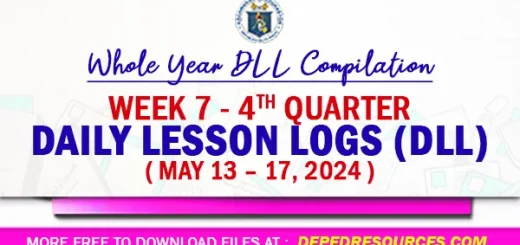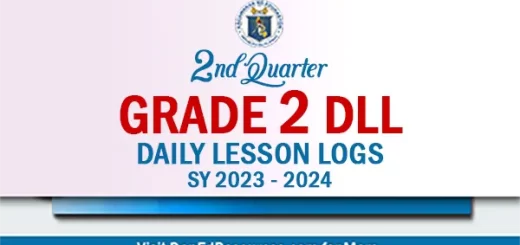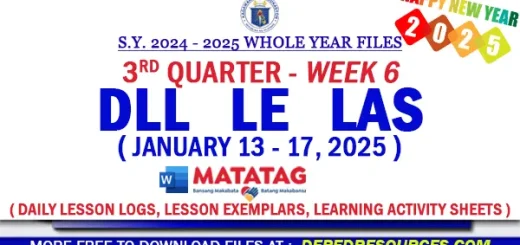New! Grade 4 Daily Lesson Log – 2nd Quarter | DepEd Resources
At DepEd Resources, you will find the Google download links for the LATEST Grade 4 Daily Lesson Log after the article below. You may read the following article or you may scroll down DepEd Resources directly for the download links.
>>> K-12 Instructional Models, Strategies and Methods
According to the Department of Education, in planning lessons, teachers can choose from a variety of instructional models and their corresponding strategies and methods. An instructional model is a teacher’s philosophical orientation to teaching. It is related to theories of learning including behaviorism, cognitivism, constructivism, social interactionism, and others.
An instructional strategy is a teaching approach influenced by the above-mentioned educational philosophies, while an instructional method is the specific activity that teachers and learners will do in the classroom.
 An instructional strategy is what a teacher uses inside the classroom to achieve the objectives of a lesson. A teacher can use a strategy or a combination of strategies to do this. Below are examples of different instructional strategies briefly explained (Saskatchewan Education 1991):
An instructional strategy is what a teacher uses inside the classroom to achieve the objectives of a lesson. A teacher can use a strategy or a combination of strategies to do this. Below are examples of different instructional strategies briefly explained (Saskatchewan Education 1991):
- Direct instruction is systematic, structured and sequential teaching. Its basic steps include presenting the material, explaining, and reinforcing it. According to Borich (2001), direct instruction methods are used to teach facts, rules, and action sequences. Direct instruction methods include compare and contrast, demonstrations, didactic questions, drill and practice, guides for reading, listening and viewing, lecture, etc.
- Indirect instruction is a teaching strategy in which the learner is an active and not passive participant. Indirect instruction methods are used for concept learning, inquiry learning and problem-centered learning (Borich 2011). Indirect instruction methods include case study, cloze procedure, concept formation, inquiry, problem solving, reflective discussion, etc.
- Interactive instruction is teaching that addresses learners’ need to be active in their learning and interact with others including their teachers and peers. Interactive methods of teaching include brainstorming, debates, cooperative learning, interviewing, small group discussion, whole class discussion, etc.
- Experiential instruction is teaching students by directly involving them in a learning experience. This strategy emphasizes the process and not the product of learning. Experiential learning methods include games, experiments, field trips, model building, field observations, role play, simulations, etc.
- Independent study is teaching in which the teacher’s external control is reduced and students interact more with the content (Petrina in press). Independent study methods aim to develop learners’ initiative, self-reliance, and self-improvement and include assigned questions, correspondence lessons, computer assisted instruction, essays, homework, learning contracts, reports, research projects, etc.
Source: Department of Education
Grade 4 Daily Lesson Log – 2nd Quarter
Week 1 Grade 4 Daily Lesson Log (August 13 – 17, 2018) (Updated!)
- GRADE 4 Daily Lesson Log in ARALING PANLIPUNAN – 2nd Quarter: Week 1
- GRADE 4 Daily Lesson Log in ENGLISH – 2nd Quarter: Week 1
- GRADE 4 Daily Lesson Log in EPP – 2nd Quarter: Week 1
- GRADE 4 Daily Lesson Log in ESP – 2nd Quarter: Week 1
- GRADE 4 Daily Lesson Log in FILIPINO – 2nd Quarter: Week 1
- GRADE 4 Daily Lesson Log in MAPEH – 2nd Quarter: Week 1
- GRADE 4 Daily Lesson Log in MATHEMATICS – 2nd Quarter: Week 1
- GRADE 4 Daily Lesson Log in SCIENCE – 2nd Quarter: Week 1
Week 2 Grade 4 Daily Lesson Log (August 20 – 24, 2018) (Updated!)
- GRADE 4 Daily Lesson Log in ARALING PANLIPUNAN – 2nd Quarter: Week 2
- GRADE 4 Daily Lesson Log in ENGLISH – 2nd Quarter: Week 2
- GRADE 4 Daily Lesson Log in EPP – 2nd Quarter: Week 2
- GRADE 4 Daily Lesson Log in ESP – 2nd Quarter: Week 2
- GRADE 4 Daily Lesson Log in FILIPINO – 2nd Quarter: Week 2
- GRADE 4 Daily Lesson Log in MAPEH – 2nd Quarter: Week 2
- GRADE 4 Daily Lesson Log in MATHEMATICS – 2nd Quarter: Week 2
- GRADE 4 Daily Lesson Log in SCIENCE – 2nd Quarter: Week 2
Week 3 Grade 4 Daily Lesson Log (August 27 – 31, 2018) (Updated!)
- GRADE 4 Daily Lesson Log in ARALING PANLIPUNAN – 2nd Quarter: Week 3
- GRADE 4 Daily Lesson Log in ENGLISH – 2nd Quarter: Week 3
- GRADE 4 Daily Lesson Log in EPP – 2nd Quarter: Week 3
- GRADE 4 Daily Lesson Log in ESP – 2nd Quarter: Week 3
- GRADE 4 Daily Lesson Log in FILIPINO – 2nd Quarter: Week 3
- GRADE 4 Daily Lesson Log in MAPEH – 2nd Quarter: Week 3
- GRADE 4 Daily Lesson Log in MATHEMATICS – 2nd Quarter: Week 3
- GRADE 4 Daily Lesson Log in SCIENCE – 2nd Quarter: Week 3
Week 4 Grade 4 Daily Lesson Log (September 3 -7, 2018) (Updated!)
- GRADE 4 Daily Lesson Log in ARALING PANLIPUNAN – 2nd Quarter: Week 4
- GRADE 4 Daily Lesson Log in ENGLISH – 2nd Quarter: Week 4
- GRADE 4 Daily Lesson Log in EPP – 2nd Quarter: Week 4
- GRADE 4 Daily Lesson Log in ESP – 2nd Quarter: Week 4
- GRADE 4 Daily Lesson Log in FILIPINO – 2nd Quarter: Week 4
- GRADE 4 Daily Lesson Log in MAPEH – 2nd Quarter: Week 4
- GRADE 4 Daily Lesson Log in MATHEMATICS – 2nd Quarter: Week 4
- GRADE 4 Daily Lesson Log in SCIENCE – 2nd Quarter: Week 4
Week 5 Grade 4 Daily Lesson Log (September 10 -14, 2018) (Updated!)
- GRADE 4 Daily Lesson Log in ARALING PANLIPUNAN – 2nd Quarter: Week 5
- GRADE 4 Daily Lesson Log in ENGLISH – 2nd Quarter: Week 5
- GRADE 4 Daily Lesson Log in EPP – 2nd Quarter: Week 5
- GRADE 4 Daily Lesson Log in ESP – 2nd Quarter: Week 5
- GRADE 4 Daily Lesson Log in FILIPINO – 2nd Quarter: Week 5
- GRADE 4 Daily Lesson Log in MAPEH – 2nd Quarter: Week 5
- GRADE 4 Daily Lesson Log in MATHEMATICS – 2nd Quarter: Week 5
- GRADE 4 Daily Lesson Log in SCIENCE – 2nd Quarter: Week 5
Week 6 Grade 4 Daily Lesson Log (September 17 – 21, 2018) (Updated!)
- GRADE 4 Daily Lesson Log in ARALING PANLIPUNAN – 2nd Quarter: Week 6
- GRADE 4 Daily Lesson Log in ENGLISH – 2nd Quarter: Week 6
- GRADE 4 Daily Lesson Log in EPP – 2nd Quarter: Week 6
- GRADE 4 Daily Lesson Log in ESP – 2nd Quarter: Week 6
- GRADE 4 Daily Lesson Log in FILIPINO – 2nd Quarter: Week 6
- GRADE 4 Daily Lesson Log in MAPEH – 2nd Quarter: Week 6
- GRADE 4 Daily Lesson Log in MATHEMATICS – 2nd Quarter: Week 6
- GRADE 4 Daily Lesson Log in SCIENCE – 2nd Quarter: Week 6
Week 7 Grade 4 Daily Lesson Log (September 24 – 28, 2018) (Updated!)
- GRADE 4 Daily Lesson Log in ARALING PANLIPUNAN – 2nd Quarter: Week 7
- GRADE 4 Daily Lesson Log in ENGLISH – 2nd Quarter: Week 7
- GRADE 4 Daily Lesson Log in EPP – 2nd Quarter: Week 7
- GRADE 4 Daily Lesson Log in ESP – 2nd Quarter: Week 7
- GRADE 4 Daily Lesson Log in FILIPINO – 2nd Quarter: Week 7
- GRADE 4 Daily Lesson Log in MAPEH – 2nd Quarter: Week 7
- GRADE 4 Daily Lesson Log in MATHEMATICS – 2nd Quarter: Week 7
- GRADE 4 Daily Lesson Log in SCIENCE – 2nd Quarter: Week 7
Week 8 Grade 4 Daily Lesson Log (October 1 – 5, 2018) (Updated!)
- GRADE 4 Daily Lesson Log in ARALING PANLIPUNAN – 2nd Quarter: Week 8
- GRADE 4 Daily Lesson Log in ENGLISH – 2nd Quarter: Week 8
- GRADE 4 Daily Lesson Log in EPP – 2nd Quarter: Week 8
- GRADE 4 Daily Lesson Log in ESP – 2nd Quarter: Week 8
- GRADE 4 Daily Lesson Log in FILIPINO – 2nd Quarter: Week 8
- GRADE 4 Daily Lesson Log in MAPEH – 2nd Quarter: Week 8
- GRADE 4 Daily Lesson Log in MATHEMATICS – 2nd Quarter: Week 8
- GRADE 4 Daily Lesson Log in SCIENCE – 2nd Quarter: Week 8
Week 9 Grade 4 Daily Lesson Log (October 8 – 12, 2018) (Updated!)
- GRADE 4 Daily Lesson Log in ARALING PANLIPUNAN – 2nd Quarter: Week 9
- GRADE 4 Daily Lesson Log in ENGLISH – 2nd Quarter: Week 9
- GRADE 4 Daily Lesson Log in EPP – 2nd Quarter: Week 9
- GRADE 4 Daily Lesson Log in ESP – 2nd Quarter: Week 9
- GRADE 4 Daily Lesson Log in FILIPINO – 2nd Quarter: Week 9
- GRADE 4 Daily Lesson Log in MAPEH – 2nd Quarter: Week 9
- GRADE 4 Daily Lesson Log in MATHEMATICS – 2nd Quarter: Week 9
- GRADE 4 Daily Lesson Log in SCIENCE – 2nd Quarter: Week 9
Week 10 Grade 4 Daily Lesson Log (October 15 – 19, 2018) (Updated!)
- GRADE 4 Daily Lesson Log in ARALING PANLIPUNAN – 2nd Quarter: Week 10
- GRADE 4 Daily Lesson Log in ENGLISH – 2nd Quarter: Week 10
- GRADE 4 Daily Lesson Log in EPP-AGRI – 2nd Quarter: Week 10
- GRADE 4 Daily Lesson Log in EPP-HE – 2nd Quarter: Week 10
- GRADE 4 Daily Lesson Log in EPP-IA – 2nd Quarter: Week 10
- GRADE 4 Daily Lesson Log in EPP-ICT – 2nd Quarter: Week 10
- GRADE 4 Daily Lesson Log in ESP – 2nd Quarter: Week 10
- GRADE 4 Daily Lesson Log in FILIPINO – 2nd Quarter: Week 10
- GRADE 4 Daily Lesson Log in MAPEH – 2nd Quarter: Week 10
- GRADE 4 Daily Lesson Log in MATHEMATICS – 2nd Quarter: Week 10
- GRADE 4 Daily Lesson Log in SCIENCE – 2nd Quarter: Week 10
These daily lesson log were made in compliance with the Department of Education format.
DepEd Resources credits these files to all the owners and authors as well as those who sent us this files for posting. We will always be thankful of you. You make DepEd Resources possible for our beloved teachers .
- Please LIKE and SHARE so everyone would benefit from these files. Thank you!
- LIKE US on Facebook! Click Here.
 Learn about the information we collect and how it's used.
Learn about the information we collect and how it's used. Discover how we protect your data.
Discover how we protect your data. Understand your rights and choices regarding your personal information.
Understand your rights and choices regarding your personal information.














